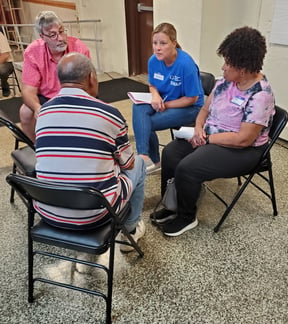My mother-in-law always said that the secret to baking excellent flaky pie crust is knowing when to stop working the pie dough. Overworking diminishes the results. Effective leaders rely on a similar secret to facilitate an excellent group discussion or decision process.
Effective facilitators know when to stop talking.
State your powerful question, repeat it slowly or show it in writing, and then just. stop. talking.
If you, as leader, have done your work in carefully crafting and testing a great open-ended question, you won’t need extra words to further explain or expand upon your question. Make sure that you ask a single clear question rather than layering in multiple questions masquerading as one question.
Silence from participants does not mean that your question was not clear enough. It means that your thought-provoking question requires careful consideration before giving a response. Give people a chance to reflect on the question and to gather their thoughts.
After posing an open-ended question, you might normalize and ask for silence. "Let's take a minute of silence to allow everyone to think about that question and jot down something." This works equally well with a small team online meeting or with hundreds of conference participants seated around tables in a large meeting hall.
Allowing silence and a moment to jot down a thought increases participation in a group. Silence allows everyone to process their thoughts at their own speed. It levels the playing field so that everyone is prepared to participate, and each person has an opportunity to contribute in turn. Asking people to share what they’ve written adds a layer of accountability. You did not ask a rhetorical question, but one that requires thought. Even with very large groups, you can ask participants to listen to the person beside them or gather people in small table groups.
 Taking a time of silence and then writing something allows for better listening. Everyone has a ready response in writing. They won't worry about forgetting what they want to say or need to plan what they will say while someone else is talking.
Taking a time of silence and then writing something allows for better listening. Everyone has a ready response in writing. They won't worry about forgetting what they want to say or need to plan what they will say while someone else is talking.
Sitting quietly with a question and then writing a response encourages more individual and original thinking. Participants who have written down their own thoughts in advance are less likely to be swayed to simply agree with what someone else in the group says. If a participant ends up having a similar response that came without conferring with another person, that becomes useful information.
Allowing for silence and writing before speaking helps to take the leader or the facilitator out of the center of the conversation. Team members or conference-goers around a table can respond by mutual invitation. After Sarai speaks, she can invite another person by name to share their thoughts. In this way, everyone participates and may give a "pass" if they feel reticent.
After each person has had a turn to speak, then it’s time for participants to respond to each other. Allow each person to speak before responding yourself or allowing anyone else to jump into a discussion. Allow participants to speak and to listen to each other rather than having a conversation with you.
Silence can be profound in the hands of a skilled group leader.
Don’t overwork the pie dough.
Tags:
Organizational Leadership, Change Management, continuous learning, Jeanne Zimmerly Jantzi, Clarity and Curiosity Blog/Jeanne%20Zimmerly-Jantzi%20Headshot%20(300x300).png)
November 30, 2023
Comments